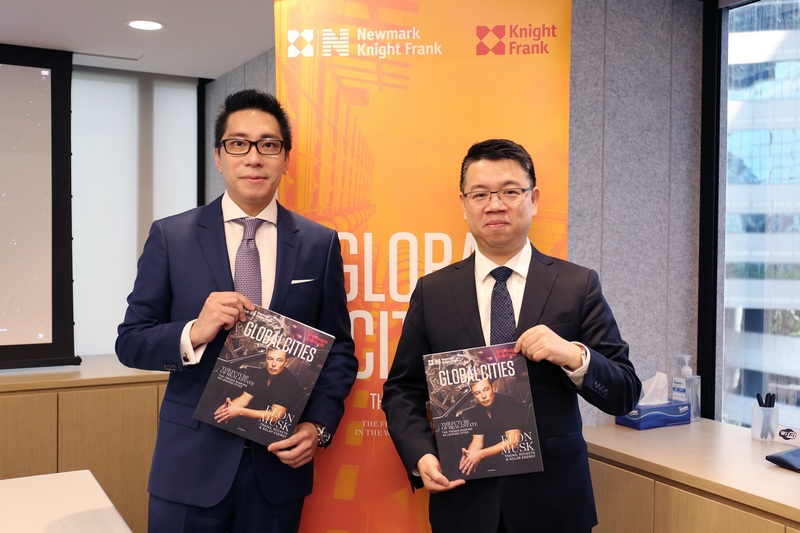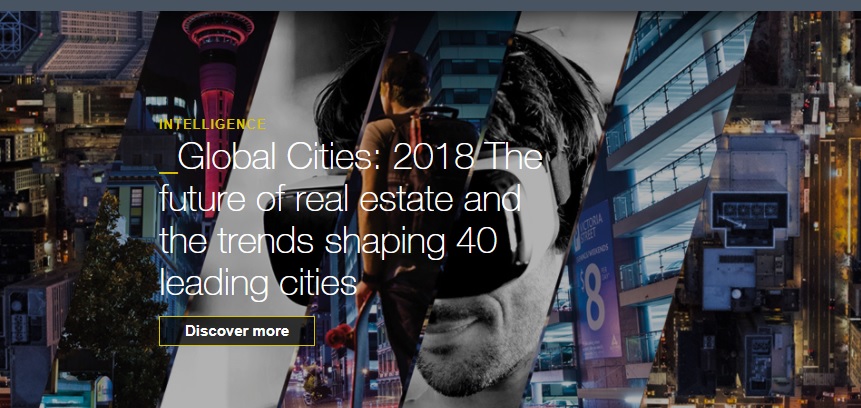(28 September 2017, Hong Kong) Knight Frank, leading international property consultancy, has launched its Global Cities: The 2018 Report. The report examines the market performance of 40 global cities across the world.
(中文简体版请按此)

From left to right: Thomas Lam, Senior Director, Head of Valuation & Consultancy and David Ji, Director, Head of Research & Consultancy, Greater China
Highlights:
- In Q2 2017, Hong Kong remained the most expensive city to rent prime office space for the fourth year running.
- From Q4 2016 to Q2 2017, Hong Kong was ranked the 9th with a 1.1% office rental growth.
- Hong Kong (Central CBD) has the smallest Grade-A office stock among major financial centres.
- For US$100 million, a buyer can acquire 17,727 sq ft (equivalent to US$5,641 per sq ft) prime office space in Hong Kong
- To increase the competitiveness of the city, the Hong Kong Government should expand the Central CBD and speed up the development of CBD2 to attract more firms to relocate to or enter the area.
- Hong Kong to remain the most expensive city to rent prime offices in the foreseeable future (3–5 years).
- Hong Kong office rents remain polarised in the Central and CBD2 markets.
- Mainland firms’ investment in Hong Kong offices is expected to slow down in 2H 2017, total volume over the year will be on par or slightly drop from last year.
Global commercial real estate themes:
Super Cities – What does a best in class city economy look like?
- Culture, diversity, lifestyle and opportunities necessary to draw talent people as well as innovation and entrepreneurial spirits.
Flexible Office Markets
- Co-working space is becoming an established feature of the real estate landscape. Co-working office provides a platform for informal networking among entrepreneurs. WeWork is now approaching 190 centres in 12 countries, with a new centre to be added to Kowloon East.
Technology and future trends
- Since 2007, unquestionably tech and R&D oriented cities have been outperforming other locations. China’s largest cities are displaying encouraging signs. Shanghai, which back in 2007 considered a manufacturing city, is growing fast as a tech centre. Three out of the top ten global internet firms in terms of revenue are Chinese firms.
- Electronic and driverless car could reshape the landscape of real estate markets, the demand for parking spaces and the development of new suburbs.
Global Capital Markets
As more capital flows towards real estate, we expect major economies and Super Cities to continue to attract most of this activity, but increasingly, investors will look to emerging markets (Boston, Frankfurt, Shanghai and Madrid) for higher returns and less competition.
The Skyscraper Index
- The Skyscraper Index which examines the rental performance of commercial buildings over 30 storeys across 23 Global Cities.
- In Q2 2017, Hong Kong remained the most expensive city to rent prime office space for the fourth year running, at US$304 per sq ft per annum, increased 9% year on year. This is 88% higher than the runner-up New York (Manhattan), compared with only 76% last year.
- Five Asian cities were among the top ten positions of the Skyscraper Index, including Hong Kong, Tokyo, Shanghai, Singapore and Beijing.
- From Q4 2016 to Q2 2017, Toronto showed the strongest office rental growth at 11.9%, followed by Beijing (7.6%), Melbourne (4.6%), San Francisco (3.5%) and Sydney (3.4%). Although Hong Kong was ranked the 9th with a 1.1% growth, Tokyo’s rents remained just stable and Shanghai and Singapore’s rents even slightly dropped.
Global Office Market Performance
- Hong Kong (Central CBD) has the smallest Grade-A office stock among major financial centres, accounting for less than 10% of New York (Manhattan)’s prime office stock. Central’s future office supply will remain limited, at least before 2020. With limited office supply in the core area of Hong Kong, Hong Kong has the lowest office yield globally of 2%. Shanghai and Beijing have higher yields of 4.3% and 4.5%.
- By 2020, Manila (+19.1), Brisbane (+16.5%), Singapore (+15.8%), Bangkok (+11.4%) and Hong Kong (+10%) are expected to lead in terms of prime office rents growth, recording double digit increments.
- For US$100 million, a buyer can acquire 17,727 sq ft (equivalent to US$5,641 per sq ft) prime office space in Hong Kong, significantly less than the second most expensive city, Tokyo, where the same amount of money can only acquire 31,282 sq ft.
Hong Kong Office Market Performance and Trends
Hong Kong Grade-A office market performance, rents and supply
- According to Knight Frank’s Skyscraper Index, Hong Kong’s US$304 per sq ft per annum office rental makes its prime offices the most expensive in the world, higher than the runner up New York Manhattan (US$162 per sq ft per annum) by a significant margin. We expect Hong Kong to remain the most expensive city to rent prime offices in the foreseeable future (3–5 years), due to considerable rental gaps between Hong Kong and other cities and sustainable demand in Hong Kong.
- With limited supply of but sustained demand for prime offices in Hong Kong, Central’s Grade-A office rents continue to increase. We expect Central Grade-A office rents to increase 2 to 4% in 2H 2017. Meanwhile in CBD2, upcoming supply in the pipeline has been suppressing rental growth, we expect office rents to drop 3 to 4% in 2H 2017 Therefore, office rents remain polarised in the Central and CBD2 markets.
- To increase the competitiveness of the city, the Hong Kong Government should expand the Central CBD and speed up the development of CBD2 to attract more firms to relocate to or enter the area.
- In September 2017, total Chinese Mainland investment in Hong Kong including commercial properties and development sites soared 48% year-on-year to reach US$4.664 billion. Given the ongoing Chinese capital outflow control we expect Mainland investment volume in Hong Kong in 2H 2017 will be somewhat subdued. This year’s total investment volume will be on par with last year’s.
- In 2017, around 13% of new office lettings in Central involved Chinese firms. Compared with only 5% in 2008 this is a significantly increase.
- With China’s capital outflow control in place, we expect that Mainland investment in Hong Kong office properties will slow down in 2H 2017. Total office investment volume over the whole year will be on par or slightly lower from last year’s.
- With a limited number of en bloc prime offices available for sale in Hong Kong, also in the past 5 years many mainland companies have already purchased offices in Hong Kong, we do not expect many such transactions in the next 2-3 years.
Full Report: http://www.knightfrank.com/blog/tag/global-cities-2018












